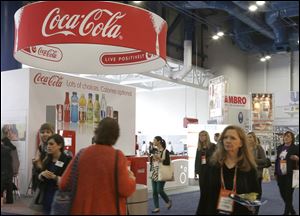
Lessons on salt for dietitians ... taught by chips, soda makers
Frito-Lay, Coke, others teach dietitians about nutrition
3/3/2014
Attendees at a conference for dietitians pass by a booth sponsored by Coca Cola in Houston. As Americans struggle to improve their eating habits, big food companies are educating the professionals who help guide people on what’s healthy and what’s not.
HOUSTON — Snack and soda makers that often are blamed for fueling the nation’s obesity rates also play a role in educating the dietitians who advise Americans on healthy eating.
Companies such as Frito-Lay, Kellogg, and Coca-Cola are essentially teaching the teachers. They are offering seminars, online classes, and workshops that are usually free to the nation’s dietitians as part of their behind-the-scenes efforts to burnish the image of their snacks and drinks. The practice has raised ethical concerns among some who say it gives the food industry too much influence over dietitians, who can take the classes for education credits to maintain their licenses.
With two-thirds of Americans considered overweight or obese, the makers of processed foods have shouldered much of the blame for aggressively marketing sugary and salty products. Critics argue that companies use the classes, which are usually less expensive and more convenient than other courses dietitians can take, as a way to cast their products in a positive nutritional light. Not to mention that companies often collect the contact information of dietitians to mail them samples or coupons, in some cases to share with their patients.
“It’s not education. It’s PR,” says Andy Bellatti, a Las Vegas-based dietitian who helped found Dietitians for Professional Integrity, a group of about a dozen dietitians who are calling for an end to the practice.
Food and beverage companies, meanwhile, say their classes are intended to inject perspective into the public debate over nutrition.
At the annual Food and Nutrition Conference and Expo, the food and beverage industry holds several workshops and classes on nutrition for many of the thousands of dietitians who show up there each year.
Last year at the conference in Houston, Frito-Lay explained to dietitians how it removed trans fats from its Lay’s potato chips and other snacks. The makers of high fructose corn syrup encouraged them to question a study that ties the prevalence of the sweetener derived from corn to higher rates of Type 2 diabetes. And the company famous for its Frosted Flakes cereal taught about the benefits of fiber.
“Has anyone tried our new chickpea burgers?” asked an employee of Kellogg, which also makes Special K and Morningstar veggie burgers.
Of course, the matter of corporate influence isn’t limited to dietitians. In 1997, the Food and Drug Administration issued guidance intended to address concerns regarding the role of drugmakers in continuing medical education for doctors. The guidance drew distinctions between ads and education, essentially stating that drug companies shouldn’t influence the latter.
Those barriers don’t exist between food companies and dietitians, however. The Academy of Nutrition and Dietetics, a professional group that is based in Chicago and has more than 75,000 members, governs the path to becoming a registered dietitian and oversees the accreditation for continuing education providers.
Glenna McCollum, president of the Academy of Nutrition and Dietetics, says that dietitians know how to question any findings that might not seem sound. “Some of the information provided may need to be challenged,” she says. “That’s part of the job.”
For registered dietitians, continuing education is a requirement, not an option. After earning a bachelor’s degree in nutrition, completing an internship program, and taking an exam, they must earn 75 credits of continuing education every five years. An hour-long class typically translates to one credit.
Education providers, which must pay a $250 application fee and a $300 annual maintenance fee thereafter, have to abide by certain standards. Classes must be based on relevant subjects, for example, and conducted by qualified personnel. But materials for individual classes are not pre-screened.
A variety of organizations provide continuing education, including universities and professional groups. But the classes can be costly. Meanwhile, the classes offered by food companies are usually online and free.
Deborah Myers, chair of the nutrition and dietetics program at Bluffton University, a small school in Ohio, estimates she spends between $700 and $1,000 a year on continuing education when factoring in travel.
She is reimbursed for professional development costs by her employer. That is not a luxury all dietitians have.
Teaching dietitians isn’t a new practice for food makers. Companies have been doing it for quite some time. For instance, General Mills, which makes Cheerios, Lucky Charms, Yoplait yogurt, Pillsbury dough, and Progresso soup, has been an education provider through its Bell Institute of Health and Nutrition for at least 15 years.
But the practice came under scrutiny after a report by public health lawyer Michele Simon last year that detailed the industry’s deep ties to the field. Shortly afterward, a small but vocal group formed Dietitians for Professional Integrity to call for changes.
A petition by the group on the subject got more than 25,000 supporters on Change.org; the academy provided an audit to the Associated Press that says only 600 of those signatures were by its members.